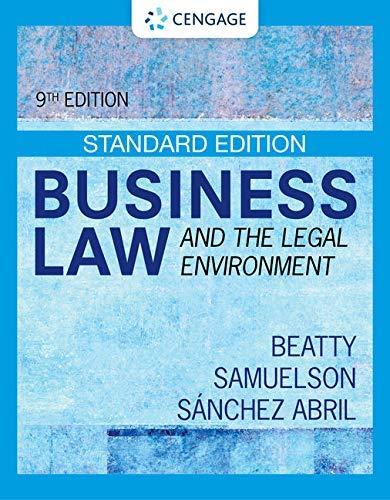Question
30-3. Business Case Problem with Sample Answer Violations of the 1934 Act. Matrixx Initiatives, Inc., makes and sells over-the-counter pharmaceutical products. Its core brand is
30-3. Business Case Problem with Sample Answer Violations of the 1934 Act. Matrixx Initiatives, Inc., makes and sells over-the-counter pharmaceutical products. Its core brand is Zicam, which accounts for 70 percent of its sales. Matrixx received reports that some consumers had lost their sense of smell (a condition called anosmia) after using Zicam Cold Remedy. Four product liability suits were filed against Matrixx, seeking damages for anosmia. In public statements relating to revenues and product safety, however, Matrixx did not reveal this information.
James Siracusano and other Matrixx investors filed a suit in a federal district court against the company and its executives under Section 10(b) of the Securities Exchange Act of 1934 and SEC Rule 10b-5, claiming that the statements were misleading because they did not disclose the information about the product liability suits. Matrixx argued that to be material, information must consist of a statistically significant number of adverse events that require disclosure. Because Siracusano's claim did not allege that Matrixx knew of a statistically significant number of adverse events, the company contended that the claim should be dismissed. What is the standard for materiality in this context? Should Siracusano's claim be dismissed? Explain. [Matrixx Initiatives, Inc. v. Siracusano, __U.S. __, 131 S.Ct. 1309, 179 L.Ed.2d 398 (2011)] (See Securities Exchange Act of 1934.)
Step by Step Solution
There are 3 Steps involved in it
Step: 1

Get Instant Access to Expert-Tailored Solutions
See step-by-step solutions with expert insights and AI powered tools for academic success
Step: 2

Step: 3

Ace Your Homework with AI
Get the answers you need in no time with our AI-driven, step-by-step assistance
Get Started


